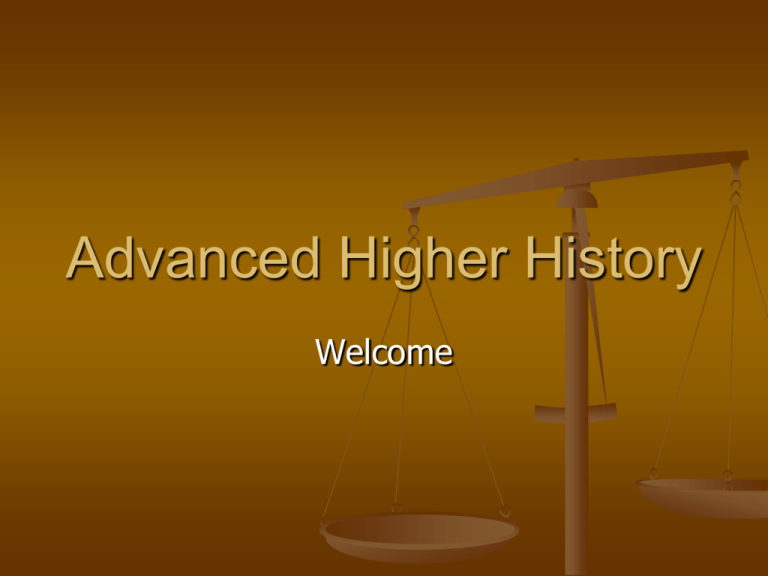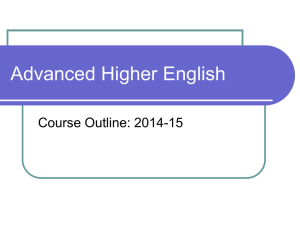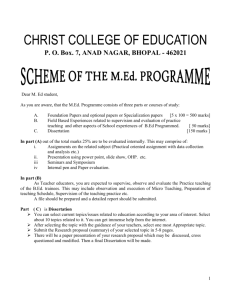Advanced Higher History
advertisement

Advanced Higher History Welcome The Course “The Advanced Higher course broadens the issues raised at Higher level, particularly with respect to international influences and the principles and practice of management. Students will benefit from the theoretical underpinning, practical experience and vocational relevance of the study of business management at this level.” “The course includes an investigation of an organisation chosen by the student, presenting an opportunity to apply skills and knowledge gained at Higher level to a real situation and to recognise at first hand the importance of enterprising behaviour in the modern business environment.” - SQA Course Units The Course comprises two mandatory Units: Historical Study (Advanced Higher) 2 credits (80 hours) Historical Research (Advanced Higher) 1 credit (40 hours) Field of Study You will study ONE field of study, from a choice of 11. “The aims of the Advanced Higher History Course are to acquire depth in the knowledge and understanding of historical themes and to develop skills of analysing issues, developments and events, drawing conclusions and evaluating sources.” You need to develop the skills of; Analysis of specific events. Consider alternative interpretationshistorians’ views. Draw together structured, reasoned arguments in well supported conclusions. Interpret complex Primary and Secondary sources. Dissertation writing. Our chosen course ‘The House Divided’: USA 1850 - 65 A study of American society and tensions within it, the causes and nature of conflict, the political, social and economic outcomes of that conflict, focusing on the themes of conflict, rights, identity and authority. Why is this course a useful one to study? Assessment Course Assessment The Course Assessment will consist of the following: ♦ a question paper with a total allocation of 90 marks ♦ a dissertation with a total allocation of 50 marks Part 1 (50 marks) consists of five essay questions for each Field of Study candidates are required to answer TWO questions each question is worth 25 marks ♦ Part 2 (40 marks) there will be a set of four sources and three questions for each Field of Study the sources will relate to the italicised boxed area of the expanded descriptor candidates are required to answer all questions questions will be worth 12, 12 and 16 marks; the 16-mark question will relate to two sources The Dissertation Dissertation ♦ titles must be drawn from the content of the Field of Study studied in the Historical Study (Advanced Higher) Unit ♦ an approved list of titles is available on the SQA website ♦ candidates should carry out research, analyse the issues, decide on an approach and plan and organise the structure and content of the dissertation The Dissertation the dissertation should be more than mere narrative or description and candidates should show familiarity with the views of secondary authorities and primary sources. dissertations should be a maximum of 4,000 words in length, excluding referential footnotes and bibliography a flat penalty of 10% of the total marks available will be deducted once the stated word limit has been exceeded Grade descriptor Grade C Grade A A structured, reasoned argument is presented in response to a defined historical issue, leading to a conclusion supported by analysis of evidence taking account of different historical interpretations The issue is perceptively defined and the argument sustained and well structured; the conclusion is closely related to the argument; there is clear evidence of understanding of different historical interpretations. Knowledge and understanding of historical events and their relationships are applied to address complex issues and their relationship to historical themes. Responses are detailed and well organised and show a coherent explanation of how events are related to each other and to relevant themes. There is a valid analysis of developments and events in their context which makes use of appropriate evidence and general historical concepts. Commentary and analysis are valid, clear, coherent and fully developed, and context and concepts are used effectively Sources are accurately interpreted, analysed and used to explain complex historical events; content and context, including the type and purpose of sources, have been taken into account. Sources are interpreted and analysed in depth. The evaluation shows accuracy, detail, relevance and thoroughness with respect to all features of the sources.








